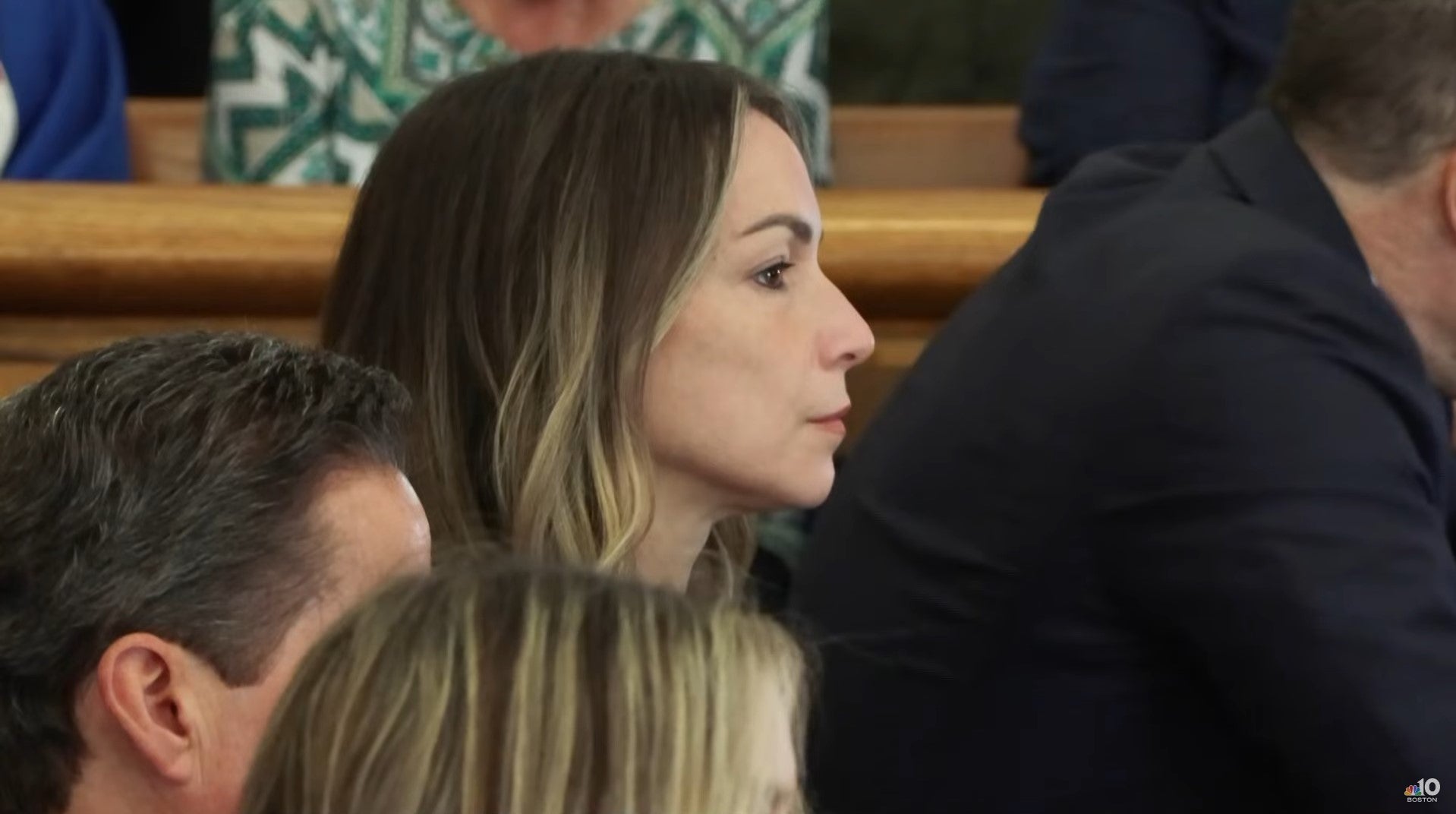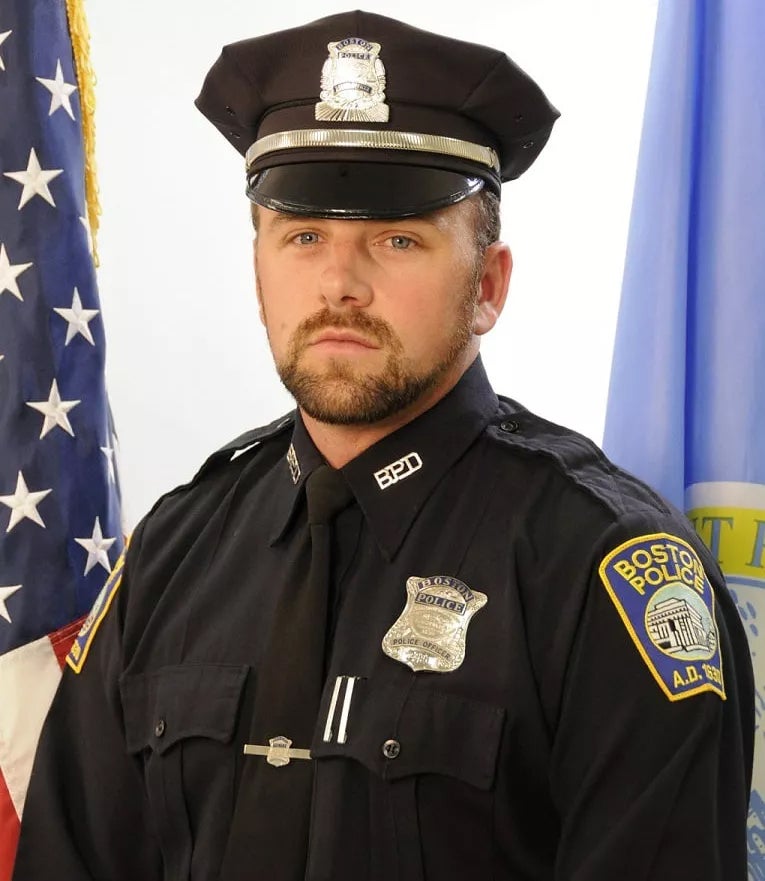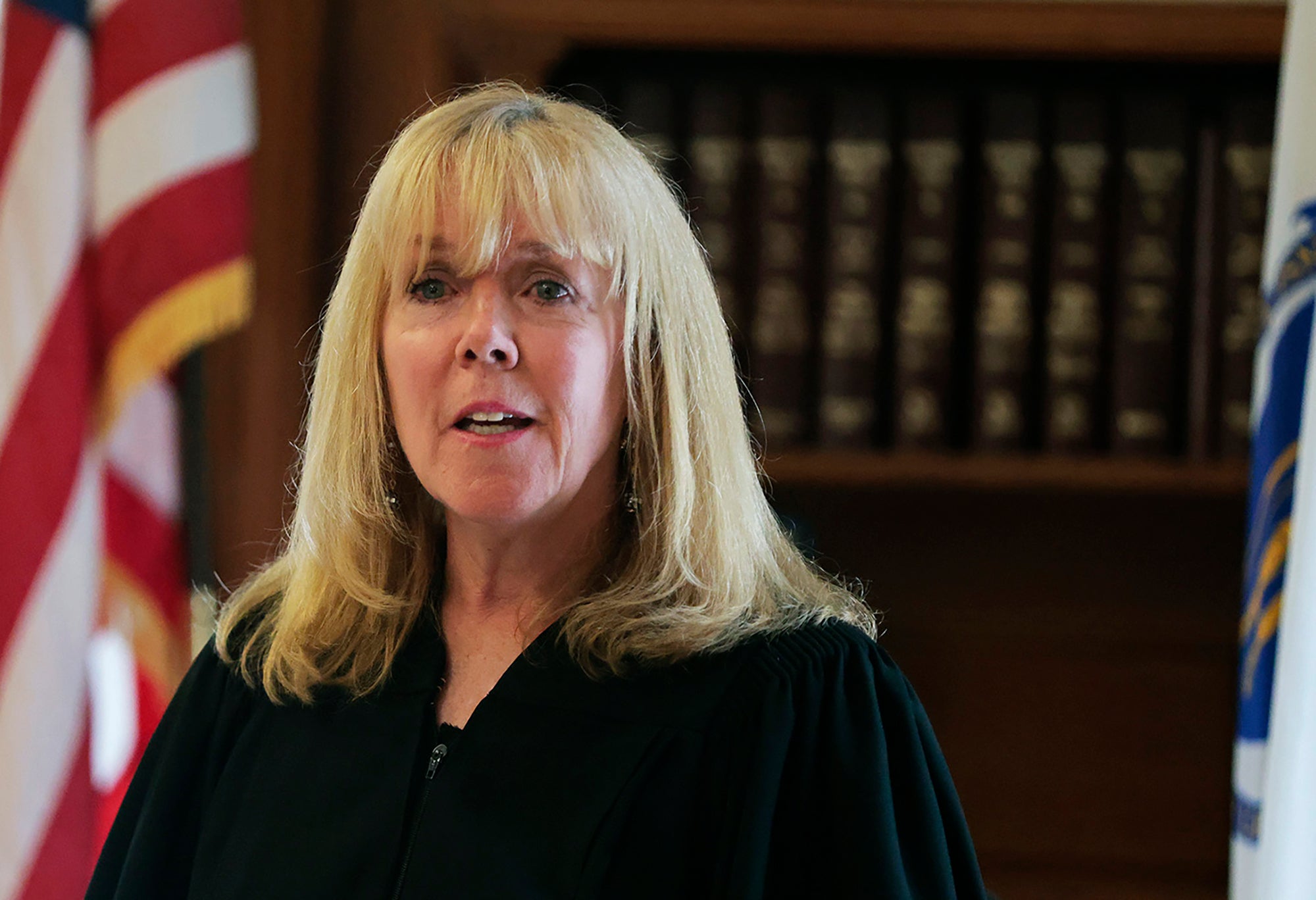Lead investigator in Karen Read murder probe told friends he ‘searched her phone for nudes,’ trial hears
Finance professor accused of killing cop boyfriend is being ‘framed’ in cover-up, her defence attorneys say
The lead investigator in the Karen Read murder probe told friends that he had “searched her phone for nudes,” the court heard during the first day of her trial on Monday.
Opening statements got under way in the high-profile trial of the college finance professor who has been charged with murder in the death of her Boston police officer boyfriend John O’Keefe.
O’Keefe’s body was found in the snow in front of a home in the early hours of 29 January 2022, following a night of partying at a bar in Canton, Massachusetts.
Days later, the 44-year-old professor was arrested and charged with murder. Prosecutors allege that Ms Read ran over her police officer boyfriend during a snowstorm and left him for dead on the freezing front lawn of their friends’ home.
Among the details which emerged in opening statements on Monday were the text messages that the lead investigator in the case, Massachusetts State Police Trooper Michael Proctor, sent to his high school friends.
Reed’s defence attorney David Yannetti told the court that Mr Proctor accessed Read’s phone without a search warrant.

“He told his buddies that he was searching her phone for nude photos, and he was disappointed he hadn’t found any yet,” Yanetti told the court.
“That is the professional and unbiased investigator who was chosen to lead the investigation into the death of John O’Keefe.”
Mr Proctor is now under investigation himself over his handling of the case. Massachusetts State Police announced this March – just weeks before Ms Read’s trial got under way – that Mr Proctor was the focus of an internal investigation for a potential violation of department policy.
The probe came one day after Ms Read’s legal team alleged that Mr Proctor has personal relationships with multiple people involved in the case – something he had failed to disclose.
Mr Proctor was reportedly friends with the Albert family. O’Keefe’s body was found out the front of the Albert property in the snow. One of the family members, Brian Albert, is a Boston police officer.
In a bombshell court hearing in March, Ms Read’s attorneys pointed to apparent text messages between Mr Proctor and the Albert family where they promised to send the trooper a thank you gift “when this is all over”.
The first day of trial also revealed that a hair belonging to O’Keefe was found on the broken tail light of his girlfriend’s car.
Prosecutors pointed to evidence showing the victim’s hair was found on Ms Read’s car, while fragments of her broken tail light were on O’Keefe’s body.
Ms Read’s defence argued in their opening statement that she has been framed for the murder, and is the victim of a cover-up.
An autopsy found that O’Keefe had several abrasions on his right forearm, two black eyes, a cut on his nose, a two-inch laceration to the back of his head and multiple skull fractures. Authorities also say hypothermia was a contributing factor in his death.
Norfolk Assistant District Attorney Adam Lally told the jury that the couple had met in 2004, briefly dated, and then rekindled their relationship in March 2020.

In the weeks leading up to Mr O’Keefe’s death, the relationship had soured, he said, claiming Ms Read had accused the victim of having an affair and had started having one of her own.
Mr Lally told jurors that Ms Read had returned to the scene of the murder before telling a friend her boyfriend had not come home and asking for their help in searching for him.
The prosecution pointed to evidence including the cracked tail light and a Google search by her friend Jennifer McCabe as to how long it would take for someone to die if left out in the cold.
In the defence’s opening statement, Ms Read’s attorney then stood up and told the jury that the prosecution’s case was based on a “shoddy and biased” investigation.
Attorney David Yannetti told the court that his client had dropped O’Keefe off at the home that night.
“Karen Read was framed. Her car never struck John O’Keefe,” he said.
“From a very early juncture in this case, you will question the Commonwealth’s theory of the case. You will question the quality of the Commonwealth’s evidence,” he added.
Earlier in April, Ms Read’s legal team presented three alleged third-party culprits who were inside the home at the time of O’Keefe’s death and which they claim have a motive for the killing, according to The Boston Globe.
This includes Brian Albert, a Boston police officer who owns the home outside of which O’Keefe was found dead, and a federal law enforcement agent named Brian Higgins, whom Ms Read’s team claims has a romantic interest in her.
Mr Yannetti said that the Alberts are a well-connected law enforcement family and that their ties to investigators meant that their home was not searched as part of the murder probe.
The attorney also said that Mr Albert and Mr Higgins had spent around 20 seconds on the phone with each other that night, with the Google search by the friend happening a short time after this.
The defence attorney also cast doubt on O’Keefe’s cause of death.

“When John O'Keefe was found, he did not look like he'd been hit by a car. He looked like he'd been beaten up,” Mr Yannetti said, arguing that the victim was a tall, large man whose injuries could not have been caused by being hit by a car going around 2mph.
“Someone – not Karen Read – ambushed John O’Keefe. Somebody probably didn’t mean to kill him but somebody probably went too far,” the attorney continued, claiming investigators failed to look into alternate suspects.
Mr Yannetti also said that the jury will hear from a snow plough driver, who passed by the house not long after prosecutors say Ms Read ran her boyfriend over. The defence attorney claims there was no body present at the time.
None of the alternate suspects laid out by the defence have been charged in connection to the case.
Supporters of Ms Read have been staging protests outside the court, insisting that she is innocent.
Earlier this month, Judge Beverly Cannone shrank the protest buffer zone outside the courthouse to 200 feet, NBC Boston reported.
“While public comment will likely continue, the rule of law will be upheld,” Judge Cannone said on the matter.

Witness accounts of the night O’Keefe died were revealed in early April in newly-unsealed court documents following a request from The Boston Globe.
Ms Read and O’Keefe had met their friend Ms McCabe at a local bar on the evening of 28 January 2022, according to witness statements. As the bar closed, the group was invited to the home of Nicole Albert and her husband Brian, a former fellow Boston police officer.
Ms Read told police she subsequently dropped O’Keefe off at the Alberts’ home. Ms Read said she went home afterwards due to stomach problems.
In the early hours of the morning on 29 January, Ms McCabe said Ms Read called her in distress. The finance professor said she had tried to contact O’Keefe and could not reach him, Ms McCabe told authorities. They later met up with another friend, Kerry Roberts, who received similar calls from Ms Read.
Ms Roberts told police Ms Read called and said her boyfriend was dead, claiming he may have been hit by a snowplough. Ms McCabe also told police Ms Read asked her: “Could I have hit him?”
The group then said they found O’Keefe unresponsive lying in the snow in front of the Alberts’ home. Ms Roberts began CPR, and Ms McCabe called the police.
After paramedics arrived, witnesses said Ms Read repeatedly asked if her boyfriend was dead. Responding troopers also observed Ms Read had a broken tail light.
The officer was taken to a nearby hospital, but succumbed to his injuries, with Ms Read arrested a few days later.
She faces charges of second-degree murder, manslaughter while operating under the influence of alcohol, and leaving the scene of personal injury and death.
The trial is expected six to eight weeks.

